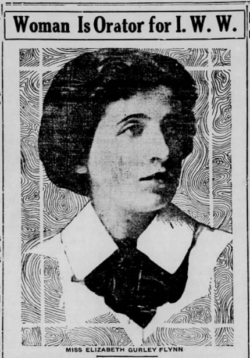No matter what your fight, don’t be ladylike!
God Almighty made women and
the Rockefeller gang of thieves made the ladies.
-Mother Jones
Saturday July 22, 1916
From Solidarity: Women Can Fight, Says Miss Flynn

Elizabeth Gurley Flynn, organizer for the Industrial Workers of the World who recently arrived in northern Minnesota to assist with the strike of the iron miners of the Mesabi Range, on July 15th had published in that organization’s weekly journal, Solidarity, an article on the problems of organizing women. Miss Flynn encourages working women to rebel against the limits enforced against them by the prevailing attitudes which dictate that women should be “lady-like” and stick to tending home and children. Yesterday Hellraisers Journal offered part one of the article; today we conclude with part two.
Problems Organizing Women
-by Elizabeth Gurley Flynn [Part II]A single girl is deluded by expectations of escape through marriage, a state which gives to the man additional incentive to fight for better conditions. The married woman worker has a two-fold burden from which her husband is immune-childbearing and housekeeping. To counteract these tremendous handicaps and draw the women of labor into its warfare is a task pitted to the I. W. W. Women and foreigners have been step-sisters and brothers in the A. F. L. The I. W. W. must be capable, large-spirited, all-inclusive to bring a message of hope into the noisiest workshop and dingiest kitchen…
To the wives and mothers the I. W. W. ideal could be presented from many angles. A happier, more wholesome family life, conditional on economic security for the bread winner, certainly appeals. The abolition of child labor and of the toil of mothers who must neglect their babies to feed them should gladden every mother’s heart that feels “the child’s sob in the silent curses deeper than the strong man in his wrath.”
The home of the future will eliminate the odd jobs that reduce it to cluttered workshop today and electricity free the woman’s hand from methods entirely antiquated in an era of machinery. There is no great credit attached to making a pie like mother used to make when a machine tended by five unskilled workers turns out 42,000 perfect pies a day! Cook stoves, washboards, and hand irons are doomed to follow the spinning wheel, candles and butter churns, into the museums, and few tears will be shed at their demise.
Catherine Alsopp, a washer woman, committed suicide in London eleven years ago and left the following poem written on a sugar bag, a fitting epitaph for woman’s labor:
Here lies a poor woman, who always was tired;
She lived in a house where help was not hired.
Her last words on earth were, “Dear friends, I am going
Where washing ain’t done, nor sweeping, nor sewing;
But everything there is exact to my wishes,
For where they don’t eat there’s no washing of dishes,
I’ll be where loud anthems will always be ringing,
But, having no voice, I”ll be clear of the singing.
Don’t mourn for me now; don’t mourn for me ever,
I’m going to do nothing for ever and ever.Birth control propaganda opens up another avenue of assault on the system, and women readers will agree upon its vital importance. Masculine opposition is theoretical, not practical, since few can understand the hopeless, hapless lot of involuntary maternity, which bequeaths a heritage of submissive despair to the offspring.
Recently I met the wife of a miner, mother of six the oldest eight, the youngest a nursing baby. She was suffering from general debility due to excessive childbearing and when I said, “I hope you’ll feel better,” she said scornfully, “I hope I die soon!” Certainly there would be more rebellion in our people if this crushing burden were lifted from women.
I am besieged by pleas for information on the subject and know the desperate chances women take with their lives under our puritanical laws, yet it is amazing how few members bring their wives when the subject is selected by a local. Our men should realize that the large family system rivets the chains of slavery upon labor more securely. It crushes the parents, starves the children, and provides cheap fodder for machines and cannons.
If women are to be active, however, their ability should not be disparaged. I know a local where members forbid their wives speaking to an I. W. W. woman “because they get queer ideas!” I heard a member forbid his wife, who had worked nine hours in a mill, from coming to the meeting “because she’d do better to clean the house.”
When I suggested an able woman as secretary of a local, several men said, “Oh, that’s a man’s job! She couldn’t throw a drunk out!” With lots of husky men around to attend to such unpleasantries, a good secretary need hardly be a Jesse Willard. The secretary of the Italian Syndicate of Agricultural Workers (their A. W. O.) is a woman of twenty-five, Maria Rugiery. It has 35,000 members, laborers in the vineyards, olive, fruit and mulberry groves, and in the fields. She was imprisoned in 1912 and led a strike of 12,000 marble cutters in 1914. In recent large struggles women have fought bravely.
[Paragraph breaks and emphasis added.]
~~~~~~~~~~~~~~~~~~~~
SOURCES
Solidarity
(Cleveland, Ohio)
-July 15, 1916
-for more on Solidarity see:
http://depts.washington.edu/iww/newspapers.shtml
Words on fire: the life and writing of Elizabeth Gurley Flynn
-ed by Rosalyn Fraad Baxandall
Rutgers University Press, 1987
https://books.google.com/books?id=mqbaAAAAMAAJ
“Hellraisers Journal: Elizabeth Gurley Flynn Arrives in Duluth to Assist Striking Miners of Mesabi Iron Range”
-by Janet Raye
https://weneverforget.org/hellraisers-journal-elizabeth-gurley-flynn-arrives-in-duluth-to-assist-striking-miners-of-mesabi-iron-range/
IMAGE
Elizabeth Gurley Flynn, Reno Gz-Jr, July 12, 1916
https://www.newspapers.com/image/147168974/
See also:
Jess Willard
https://en.wikipedia.org/wiki/Jess_Willard
Note: My searches have turned up nothing on Maria Rugiery or on Italian Syndicate of Agricultural Workers. More research needed.
Bread and Roses – Joan Baez & Mimi Fariña
